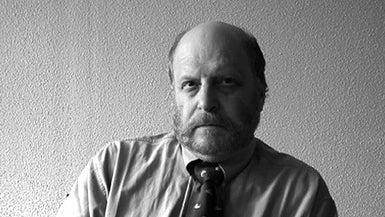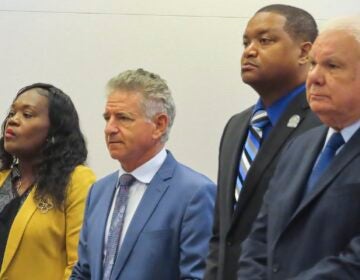Middle East expert Michael Barry to leave Princeton University

Michael Barry is a lecturer in the Near Eastern Studies department at Princeton University. (Photo courtesy of ©Patrick Pleutin for Afghanculturemuseum.org)
In the late 1970’s, Professor Michael Barry left his Ph.D. studies to help Afghans during the Soviet invasion, risking his life alongside Muslim guerrilla warriors. Today, Barry faces the end of his teaching career at Princeton University after the administration decided not to renew his lecturing contract.
“This is a really terrible move on Princeton’s part,” Professor William Beeman, who is a Middle East expert and Chair of the Anthropology Department at the University of Minnesota, said in a phone interview. “It shows me and it shows the rest of the world that Princeton has very poor academic values. It really is a stain on the Princeton administration.”
Barry has written extensively on human rights violations and political developments in the region, but has also focused on much older aspects of Middle Eastern civilization, like its art and poetry. His translation of the works of medieval Persian poet Nezâmî into French earned him a prize from the Iranian government, and he won France’s prestigious Prix Femina in 2002 for his biography of Ahmad Massoud.
He is also holds a B.A. in Near Eastern Studies from Princeton, a post-graduate degree in Anthropology from Cambridge, an M.A. from McGill University and a Ph.D. from the École des Hautes Études en Sciences Sociales in Paris.
Beeman said that among Barry’s many accomplishments, his book on “Figurative Art in Medieval Islam” stands out in the expert community as one of his most impressive feats.
“It is an extraordinarily beautiful book that will remain the definitive work on this subject forever,” Beeman said. “It will never be surpassed.”
He added that Barry has been active in current political affairs in Afghanistan, writing reports on trials and conducting humanitarian work.
Barry was invited to testify on the Afghan wars in front of the Foreign Relations Committee in 1981, and was asked by President Ronald Reagan to confer with him and a group of Afghan witnesses a year later.
“I can hardly even imagine anyone who has the erudition and knowledge that he does of the Islamic world and of the classical world,” Beeman, who embarked with Barry on an excursion of the Afghan mountains by horseback as a graduate student, said. “He’s a treasure.”
Students and alumni have protested Barry’s dismissal and questioned the university over its administrative policies, launching two petitions with over 250 signatures. Students and alumni have also addressed personal letters to the administration in support of Barry.
The university stated that Barry’s contract was not renewed to make room for entry-level junior faculty members on the tenure track.
Beeman said he was shocked by Princeton’s decision not to renew Barry’s contract, and that he suspects departmental politics and budget issues may have caused the non-renewal. As a prolific and award-winning scholar, Barry should have been set on a professorial track and granted tenure, Beeman said.
Princeton junior Hammad Aslam said that Barry inspired him to change his major from Economics to Near Eastern studies.
“Professor Barry has been the best educator I have had in my entire life,” Hammad said, adding that he was particularly inspired by Barry’s account of the many connections between ancient philosophy and Sufism.
Barry said that he was very frustrated and surprised by his non-renewal given that his classes are over-enrolled and receive very positive reviews. He said that he wishes he had entered Princeton as a professor rather than a lecturer, as he then could have been considered for tenure
“I was trapped by having entered by the side door as a lecturer as opposed to coming in on the junior track,” Barry said. Barry also said that he is only two years away from retirement, and that he is supporting his ailing wife.
Barry’s latest book, “Kabul’s Long Shadows,” discusses his views on Afghanistan and current U.S. policy in the region.
The crisis engulfing the Islamic world today has its epicenter in the territorial dispute between Pakistan and Afghanistan, Barry said. The United States strategically sided with Pakistan in the 1950’s, while the Soviet Union and India sided with Afghanistan, a historical divide that led to massive bloodshed and military armament on both sides.
The United States’ historical alliance with Pakistan had catastrophic results after the U.S. agreed to fund and train Muslim fundamentalists to combat the Soviet Union in the 1980’s, Barry said.
“All this exploded in American faces on September 11th of 2001 when the U.S. realized, to its horror, that the extremist Sunni ideology promoted by Pakistani generals was in fact anti-American,” Barry said.
President Bush neglected Afghanistan in favor of Iraq, Barry said, contributing to the region’s current instability. The U.S. is now mired in the Pakistani-Afghan conflict, and has left Afghans feeling like their country does not have a chance at a better future.
“There’s a constant trend to downplay and to denigrate Afghanistan in the United States,” Barry said. Even the Obama administration, which he said was reluctant to stay in the region, has sent thousands of troops out of fear that withdrawal would lead to chaos as it did in Iraq.
Although Barry said he supports Hillary Clinton as future U.S. President, he predicts that U.S. military involvement will remain similar regardless of the next administration’s party allegiance.
Barry has been a special consultant to the Aga Khan Trust for Culture since 2009, and is a former consultative chairman of the Metropolitan Museum of Art’s Department of Islamic Art. He speaks native Persian, Arabic, French, Italian and Spanish, among other languages.
As a lecturer at Princeton, Barry seeks to impart his students with knowledge beyond the bloodiness of modern conflict in the Middle East.
“My concern is that civilizations in crisis, like the Islamic world today, can attract increasing attention to their most apparently negative aspects, risking neglect of the fundamental civilization upon which they rest,” Barry said.
Barry is teaching “Introduction to Later Sufism” this semester with over 170 undergraduate students, “Granada and the Fall of Spanish Islam,” and a graduate seminar on “Studies in Later Persian Literature.”
WHYY is your source for fact-based, in-depth journalism and information. As a nonprofit organization, we rely on financial support from readers like you. Please give today.




